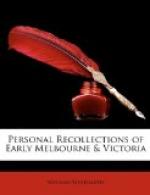With the gold tide came at first such heavy expenses, much of them quite unforeseen and unprepared for, that the press interest was run, of necessity, into heavy debt, where there was no adequate capital. It was either this or to give up the game in those changing times; and those who had not the money or the credit went to the wall, to make room for others less embarrassed. “The Argus” thus got heavily into debt to its agents and bankers; but after 1854, which had been a most trying year of inevitable reaction, there was gradual recovery, and eventually a due reward in commissions and interest to its supporters.
The prosperity of “The Argus” about this time was unprecedented in the antipodes, and for a considerable interval the paper stood unrivalled, not only in Victoria but in Australasia, having at last surpassed, both in circulation and in the profits of business contents, even the long-established and highly respectable “Sydney Morning Herald”, it was allowed, and not unfairly, to be “The Times” of the Southern Hemisphere, for Wilson had retired in favour of more temperate editorship; and in supporting, and being supported by, the mercantile interests, and in the adoption generally of the Freetrade policy of the parent state, the paper followed its northern prototype.
But the clearing of the ground had left room for other and better accoutred rivals, and “The Age” arose to enter the lists with “The Argus”. The latter had taken up Freetrade and the “classes;” the former took up Protection and the “masses;” so far, at least as these terms might, as to either application, distinguish democratic Victoria’s condition. Protection had been quite in abeyance under the old regime, beyond at least, an occasional sigh from agricultural Geelong for higher prices for the farmer, “the mainstay of every country.” Even during the interregnum of semi-constitutionalism, 1851-55, the tendency had been effectually checked, chiefly by the energy of the Collector of Customs, Mr. Cassell, then one of the Official Legislative Members, who, supported by the Melbourne Chamber of Commerce, was bent upon a tariff of the Home kind, of half-a-dozen leading articles, with perfect freedom of exchange over the world for all products of the colony’s labour. But Mr. Cassell, to universal regret, on general as on commercial grounds, died in November, 1853, leaving the colony a less obstructed road to those restrictions which it has since seen fit to impose upon its own industry. “The Age”, with remarkable ability and as remarkable success, has always advocated Protection. But at first, as my recollection goes, it was in that qualified way which is not necessarily against trading freedom, reasonably considered. I perfectly recall the late Mr. Syme’s main argument, or excuse, to the effect that the Western United States, for instance, should, on social considerations, restrict universal wheat-growing, even at economic loss. But if one may judge from some recent Freetrade and Protection controversy as between Victoria and New South Wales (see “Age” for April-May, 1887), all qualification seems now dropped, and even direct economic advantage expected from Protection.




